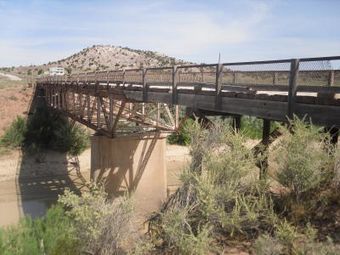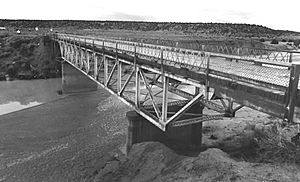Allentown Bridge facts for kids
Quick facts for kids |
|
|
Allentown Bridge
|
|

Allentown Bridge
|
|
| Location | Puerco River, Houck, Arizona |
|---|---|
| Built | 1923 |
| Architect | Midland Bridge Company |
| Architectural style | steel rigid-connected PFan deck tma |
| NRHP reference No. | 88001617 |
| Added to NRHP | September 30, 1988 |
The Allentown Bridge is a special bridge in Apache County, Arizona. It crosses the Puerco River near a place called Houck, Arizona. This bridge was finished in 1923. It is listed on the National Register of Historic Places. This means it's an important old structure.
Contents
The Bridge's Story
Why Was the Bridge Built?
In 1922, a main road between Adamana and New Mexico was being improved. New bridges were planned for this road. They were needed to cross the Puerco River. One bridge was for near Allentown. Another was for near Sanders. A smaller bridge was also planned for Lupton Arroyo.
Before these bridges, cars had to wait for the river water to go down. Sometimes, they waited up to 24 hours! This made travel very slow.
Building the Bridge
The Arizona Highway Department (AHD) designed the bridges. The Allentown bridge design was for a medium-sized deck truss. It had special ends that stuck out. On January 1, 1923, AHD asked companies to bid on building the bridges.
A company from Denver, the Midland Bridge Company, won the contract. They would build the Allentown bridge. It cost $11,675. Money came from Apache County and the state road fund. Construction started on January 17 and finished on July 11. This road later became part of U.S. Highway 66.
What Happened Next?
In 1931, U.S. Highway 66 changed its route. The Allentown bridge was no longer on the main highway. The Sanders bridge also went off the route. Today, the Allentown bridge is still used. It carries local traffic on the Navajo Nation.
How the Bridge Is Built
The bottom parts of the bridge are concrete. These are called abutments and piers. The top part is made of strong steel. It is a riveted steel 9-panel Pratt deck truss. Both ends of the bridge stick out.
The bridge has steel guardrails. It also has wooden parts at the ends where the road meets the bridge. The main part of the bridge is 90 feet long. It is 15.2 feet wide. The total length of the bridge is 206 feet.
On September 30, 1988, the bridge was added to the National Register of Historic Places. It is one of the first bridges of its kind built by the State Engineer. It is also one of the earliest deck truss bridges in Arizona. Its special sticking-out ends are unique for bridges built for cars in Arizona.




